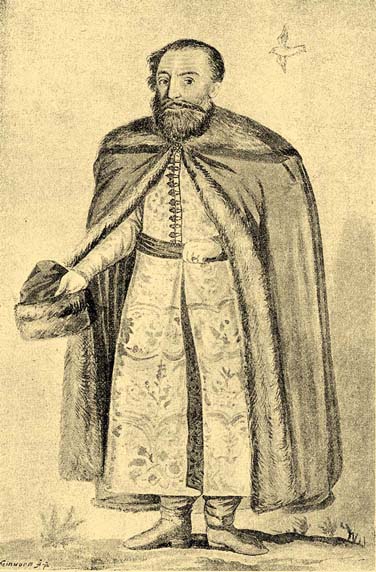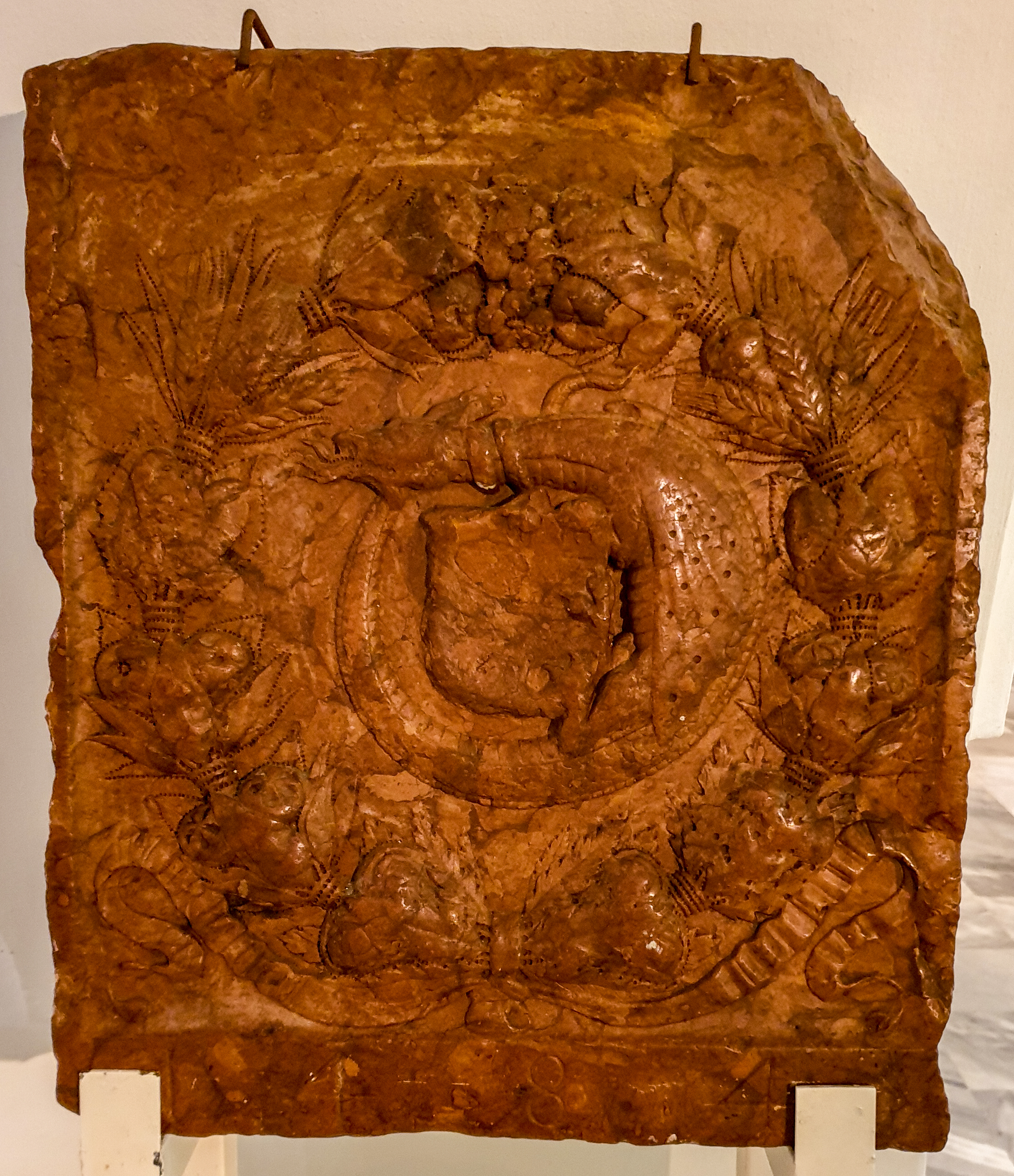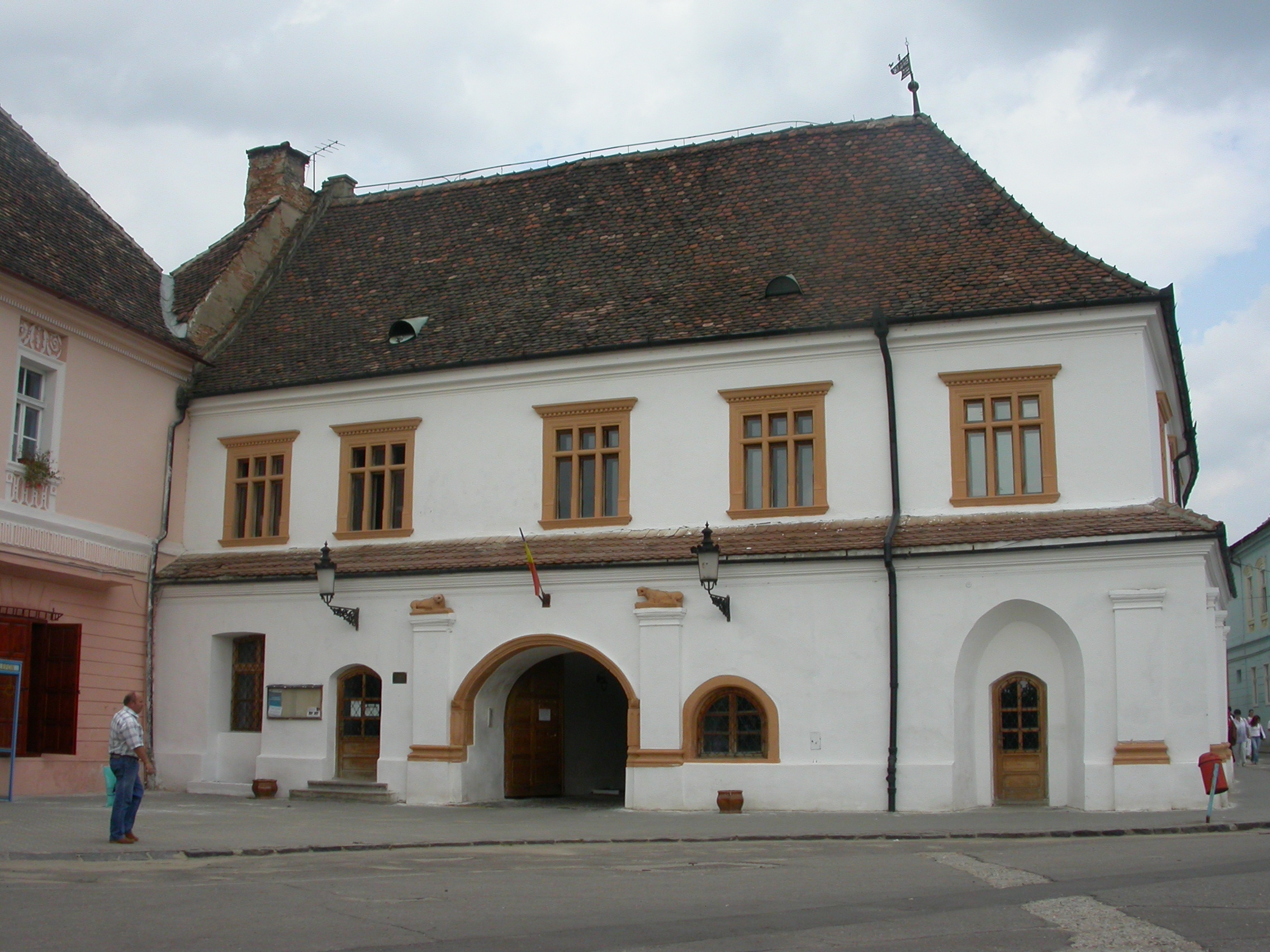|
Michael Weiß (politician)
Michael Weiß (also spelled ''Michael Weiss'', born in 1569, in Medgyes (German: Mediasch, today Mediaș, Romania), deceased 16 October 1612, in Barcaföldvár (German: Marienburg, today Feldioara, Romania) was a Transylvanian Saxon politician and historian. He is mostly known for being the mayor of Brassó (German: Kronstadt, modern-day Brașov, Romania). Biography He was born in Medgyes as the son of mayor Johannes Weiß and his wife, Gertrude Wolf, both of whom would die of the plague in 1586. He went to the local elementary school, then, in 1583, aged 14, he attended the courses of the Jesuit school of Kolozsvár (German: Klausenburg, today Cluj-Napoca, Romania). During the two years spent there, Weiß learned Hungarian, and progressed enough as to be able to write poems in this language. Shortly, he began his political career, as secretary of Count Ferdinand von Hardek, and then by working for the Hungarian chancellor office in Prague. He was noticed by Emperor Rudolf I ... [...More Info...] [...Related Items...] OR: [Wikipedia] [Google] [Baidu] |
Michael Weiss
Michael Weiss may refer to: Sports * Michael Weiss (figure skater) (born 1976), American former figure skater * Michael Weiss (swimmer) (born 1991), American swimmer * Michael Weiss (triathlete) (born 1981), Austrian triathlete and cyclist * Michael Weiß (football manager) (born 1965), German association football coach Other * Michael Weiss (engineer), American engineer in NASA in-orbit satellite program * Michael Weiss (journalist), American journalist and author * Michael Weiss (mathematician) (born 1955), German mathematician * Michael Weiss (pianist) (born 1958), jazz pianist and composer * Michael David Weiss (1967–1999), American lawyer who fought to provide nurses with safer syringes, as told in the 2011 feature film ''Puncture'' * Michael T. Weiss (born 1962), American actor * Michael Weiß (politician) Michael Weiß (also spelled ''Michael Weiss'', born in 1569, in Medgyes (German: Mediasch, today Mediaș, Romania), deceased 16 October 1612, in Barcaföldvár (German ... [...More Info...] [...Related Items...] OR: [Wikipedia] [Google] [Baidu] |
Báthory Family
The Báthory family ( pl, Batory) was a Hungarian noble family of the Gutkeled clan. The family rose to significant influence in Central Europe during the Late Middle Ages, holding high military, administrative and ecclesiastical positions in the Kingdom of Hungary. In the early modern period, the family brought forth several Princes of Transylvania and one King of Poland and Grand Duke of Lithuania (Stephen Báthory). Origins The Báthory family belonged to the '' Gutkeled'', a clan of Hungarian nobles, which traced its descent to the Swabian brothers ''Gut'' and ''Kelad'', who immigrated into Hungary from the castle ''Stof'' (probably Staufen im Breisgau or Hohenstaufen in Württemberg) during the reign of King Peter (reigned 1038–1046), who himself was partly of Venetian descent.Simon Kezai, Lázló Veszprémy, Frank Schaer (ed.), ''Gesta Hungarorum: The Deeds of the Hungarians'' (Central European Medieval Texts). Central European University Press, 1999. In 1279 ... [...More Info...] [...Related Items...] OR: [Wikipedia] [Google] [Baidu] |
Transylvanian Saxon People
Transylvania ( ro, Ardeal or ; hu, Erdély; german: Siebenbürgen) is a historical and cultural region in Central Europe, encompassing central Romania. To the east and south its natural border is the Carpathian Mountains, and to the west the Apuseni Mountains. Broader definitions of Transylvania also include the western and northwestern Romanian regions of Crișana and Maramureș, and occasionally Banat. Transylvania is known for the scenery of its Carpathian landscape and its rich history. It also contains Romania's second-largest city, Cluj-Napoca, and other iconic cities and towns such as Brașov, Sibiu, Târgu Mureș, Alba Iulia and Sighișoara. It is also the home of some of Romania's UNESCO World Heritage Sites such as the Villages with fortified churches, the Historic Centre of Sighișoara, the Dacian Fortresses of the Orăștie Mountains and the Roșia Montană Mining Cultural Landscape. It was under the rule of the Agathyrsi, part of the Dacian Kingd ... [...More Info...] [...Related Items...] OR: [Wikipedia] [Google] [Baidu] |
16th-century Hungarian People
The 16th century begins with the Julian year 1501 ( MDI) and ends with either the Julian or the Gregorian year 1600 ( MDC) (depending on the reckoning used; the Gregorian calendar introduced a lapse of 10 days in October 1582). The 16th century is regarded by historians as the century which saw the rise of Western civilization and the Islamic gunpowder empires. The Renaissance in Italy and Europe saw the emergence of important artists, authors and scientists, and led to the foundation of important subjects which include accounting and political science. Copernicus proposed the heliocentric universe, which was met with strong resistance, and Tycho Brahe refuted the theory of celestial spheres through observational measurement of the 1572 appearance of a Milky Way supernova. These events directly challenged the long-held notion of an immutable universe supported by Ptolemy and Aristotle, and led to major revolutions in astronomy and science. Galileo Galilei became a champion of ... [...More Info...] [...Related Items...] OR: [Wikipedia] [Google] [Baidu] |
1612 Deaths
Year 161 ( CLXI) was a common year starting on Wednesday (link will display the full calendar) of the Julian calendar. At the time, it was known as the Year of the Consulship of Caesar and Aurelius (or, less frequently, year 914 ''Ab urbe condita''). The denomination 161 for this year has been used since the early medieval period, when the Anno Domini calendar era became the prevalent method in Europe for naming years. Events By place Roman Empire * March 7 – Emperor Antoninus Pius dies, and is succeeded by Marcus Aurelius, who shares imperial power with Lucius Verus, although Marcus retains the title Pontifex Maximus. * Marcus Aurelius, a Spaniard like Trajan and Hadrian, is a stoical disciple of Epictetus, and an energetic man of action. He pursues the policy of his predecessor and maintains good relations with the Senate. As a legislator, he endeavors to create new principles of morality and humanity, particularly favoring women and slaves. * Aurelius reduces ... [...More Info...] [...Related Items...] OR: [Wikipedia] [Google] [Baidu] |
1569 Births
Year 1569 ( MDLXIX) was a common year starting on Saturday (link will display the full calendar) of the Julian calendar. Events January–June * January 11– May 6 – The first recorded lottery in England is performed nonstop, at the west door of St Paul's Cathedral. Each share costs ten shillings, and proceeds are used to repair harbours, and for other public works. * March 13 – Battle of Jarnac: Royalist troops under Marshal Gaspard de Tavannes surprise and defeat the Huguenots under the Prince of Condé, who is captured and murdered. A substantial proportion of the Huguenot army manages to escape, under Gaspard de Coligny. * June 10 – German Protestant troops reinforce Coligny, near Limoges. July–December * July 1 – The Union of Lublin unites the Kingdom of Poland and the Grand Duchy of Lithuania into a single state, the Polish–Lithuanian Commonwealth, following votes in the Assemblies of three Lithuanian provinces (Volhynia, Ukraine and Podlasie) ... [...More Info...] [...Related Items...] OR: [Wikipedia] [Google] [Baidu] |
Johannes Honterus
Johannes Honter (also known as Johann Hynter; Latinized as Johann Honterus or Ioannes Honterus; Romanian sources may credit him as Ioan, Hungarian ones as János; 1498 – 23 January 1549) was a Transylvanian Saxon, renaissance humanist, Protestant reformer, and theologian. Honter is best known for his geographic and cartographic publishing activity, as well as for implementing the Lutheran reform in Transylvania and founding the church, which would become the Evangelical Church of the Augsburg Confession in Romania, after Romania annexed Transylvania. Education and activity Early life Born in Brassó ''(German: Kronstadt, today Brașov, Romania)'', Transylvania, Kingdom of Hungary, he studied at the University of Vienna between 1520 and 1525, graduating with a '' magister artium'' title. As the Ottomans approached Vienna in 1529 (''see Siege of Vienna''), Honter moved first to Regensburg, and, in 1530, he registered at the Kraków's Jagiellonian University (in Pol ... [...More Info...] [...Related Items...] OR: [Wikipedia] [Google] [Baidu] |
Eugen Von Trauschenfels
Johann Karl Eugen Trausch von Trauschenfels was a Transylvanian publicist of The House of Trausch von Trauschenfels. He was born in 1833, in Kronstadt (current-day Brașov, Romania) and died in 1903, in the same city. 1833 births 1903 deaths People from Brașov Transylvanian Saxon people Members of the Austrian House of Deputies (1861–1867) 19th-century Hungarian historians Hungarian jurists Austrian jurists 19th-century Austrian historians Opinion journalists Hungarian columnists {{Europe-noble-stub ... [...More Info...] [...Related Items...] OR: [Wikipedia] [Google] [Baidu] |
Democratic Forum Of Germans In Romania
The Democratic Forum of Germans in Romania (german: Demokratisches Forum der Deutschen in Rumänien, DFDR; ro, Forumul Democrat al Germanilor din România, FDGR; in short or ) is a political party (legally recognized as an association of public utility according to the governmental decision HG 599 as per 4 June 2008) organised on ethnic criterion representing the interests of the German minority in Romania. Initially, the FDGR/DFDR was a cultural association representing the culture of the German community in Romania, but it subsequently became a moderately successful local political party (especially amongst Romanian voters as well), most notably in parts of Transylvania (central Romania) and Banat (south-western Romania). Consequently, the counties where the FDGR/DFDR obtained the highest political scores in many local elections after 1989 are Sibiu and Timiș respectively. History (1989–present) The forum was founded at the end of 1989, in the wake of the Romanian Revo ... [...More Info...] [...Related Items...] OR: [Wikipedia] [Google] [Baidu] |
Sibiu
Sibiu ( , , german: link=no, Hermannstadt , la, Cibinium, Transylvanian Saxon: ''Härmeschtat'', hu, Nagyszeben ) is a city in Romania, in the historical region of Transylvania. Located some north-west of Bucharest, the city straddles the Cibin River, a tributary of the river Olt. Now the capital of the Sibiu County, between 1692 and 1791 and 1849–65 Sibiu was also the capital of the Principality of Transylvania. Nicknamed ''The City with Eyes'', the city is a well-known tourist destination for both domestic and foreign visitors. Known for its culture, history, gastronomy and diverse architecture, which includes the iconic houses with eyes that gave Sibiu its nickname, the city has garnered significant attention since the beginning of the 21st century. In 2004, its historical center began the process of becoming a UNESCO World Heritage Site. Sibiu was designated the European Capital of Culture in 2007. One year later, it was ranked "Europe's 8th-most idyllic place to l ... [...More Info...] [...Related Items...] OR: [Wikipedia] [Google] [Baidu] |
Gabriel Báthory
Gabriel Báthory ( hu, Báthory Gábor; 15 August 1589 – 27 October 1613) was Prince of Transylvania from 1608 to 1613. Born to the Roman Catholic branch of the Báthory family, he was closely related to four rulers of the Principality of Transylvania (a vassal state of the Ottoman Empire which had developed in the eastern territories of the medieval Kingdom of Hungary). His father, Stephen Báthory (1553–1601), Stephen Báthory, held estates in the principality, but never ruled it. Being a minor when his father died in 1601, Gabriel became the ward (law), ward of the childless Stephen Báthory (1555–1605), Stephen Báthory, from the Protestant branch of the family, who converted him to Calvinism. After inheriting most of his legal guardian, guardian's estates in 1605, Gabriel became one of the wealthiest landowners in Transylvania and Royal Hungary (a realm of the Habsburg Empire which included the northern and western parts of medieval Hungary). Gabriel made an allia ... [...More Info...] [...Related Items...] OR: [Wikipedia] [Google] [Baidu] |





